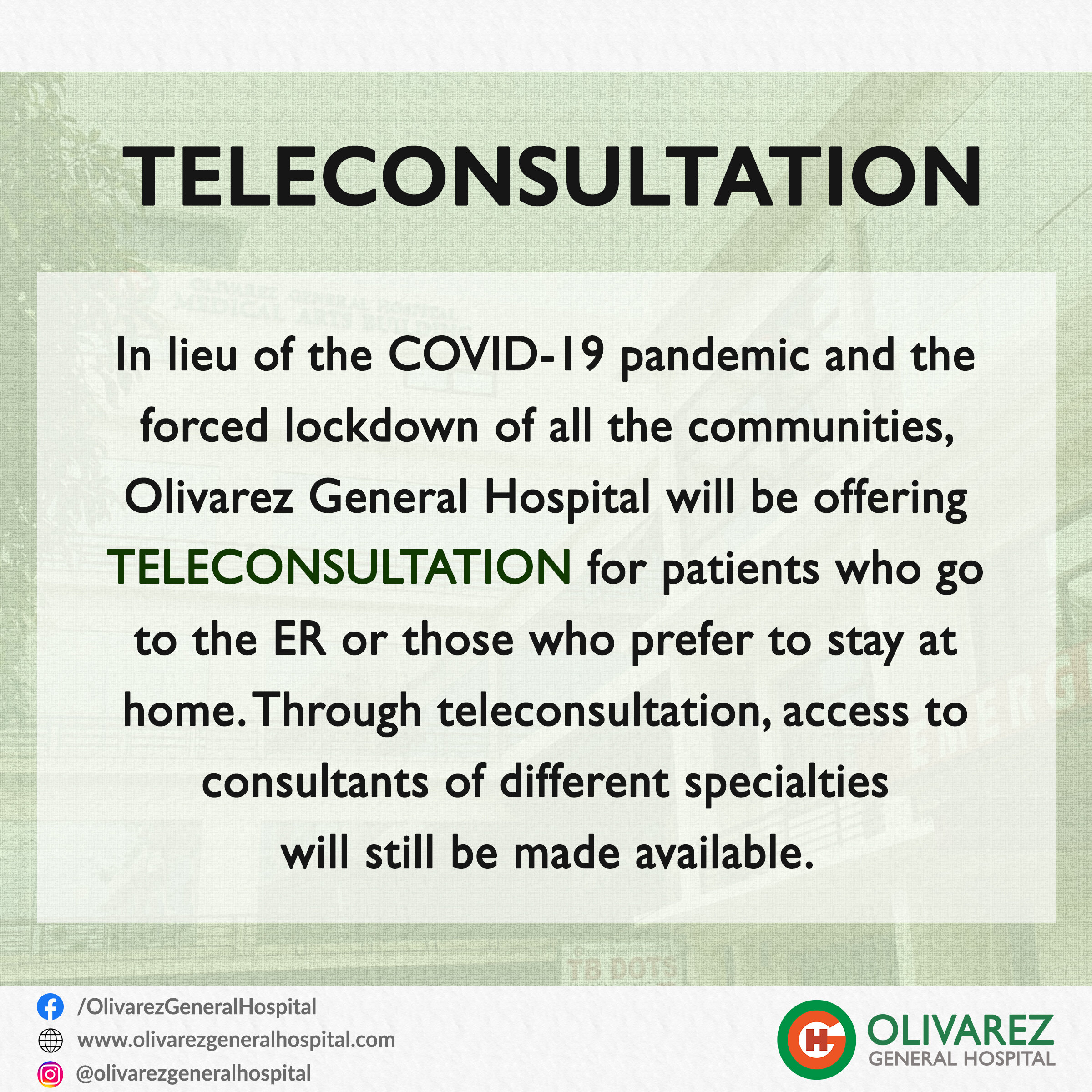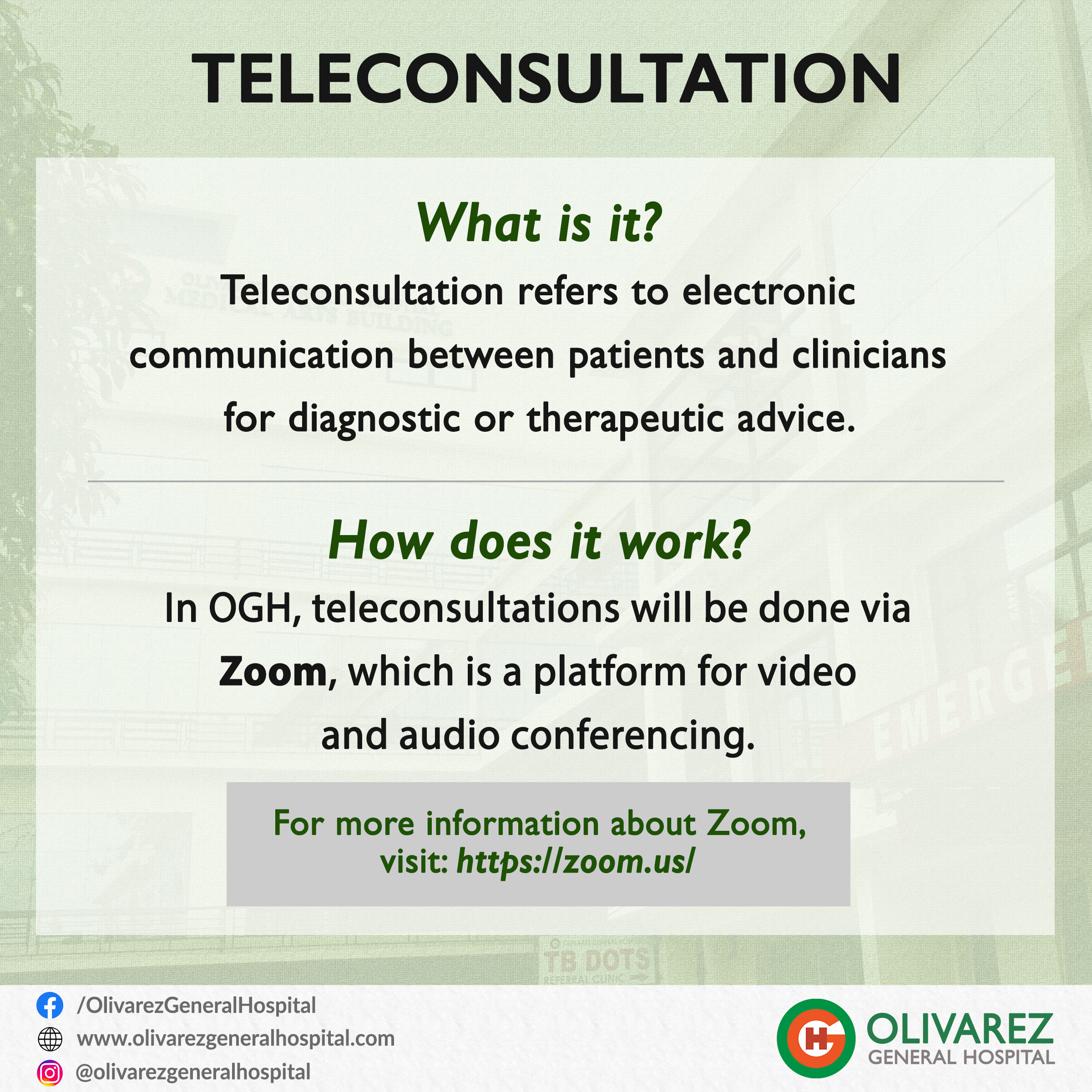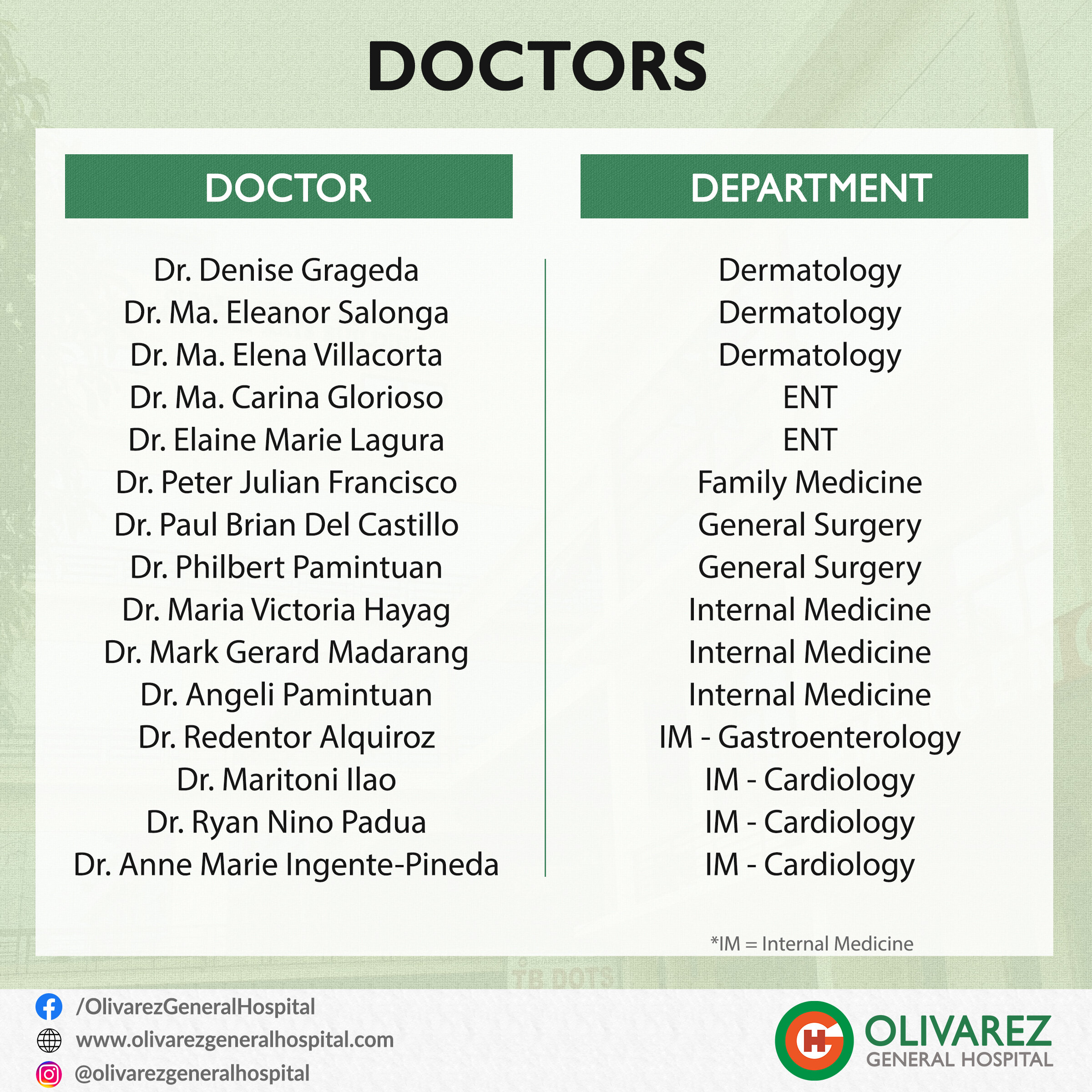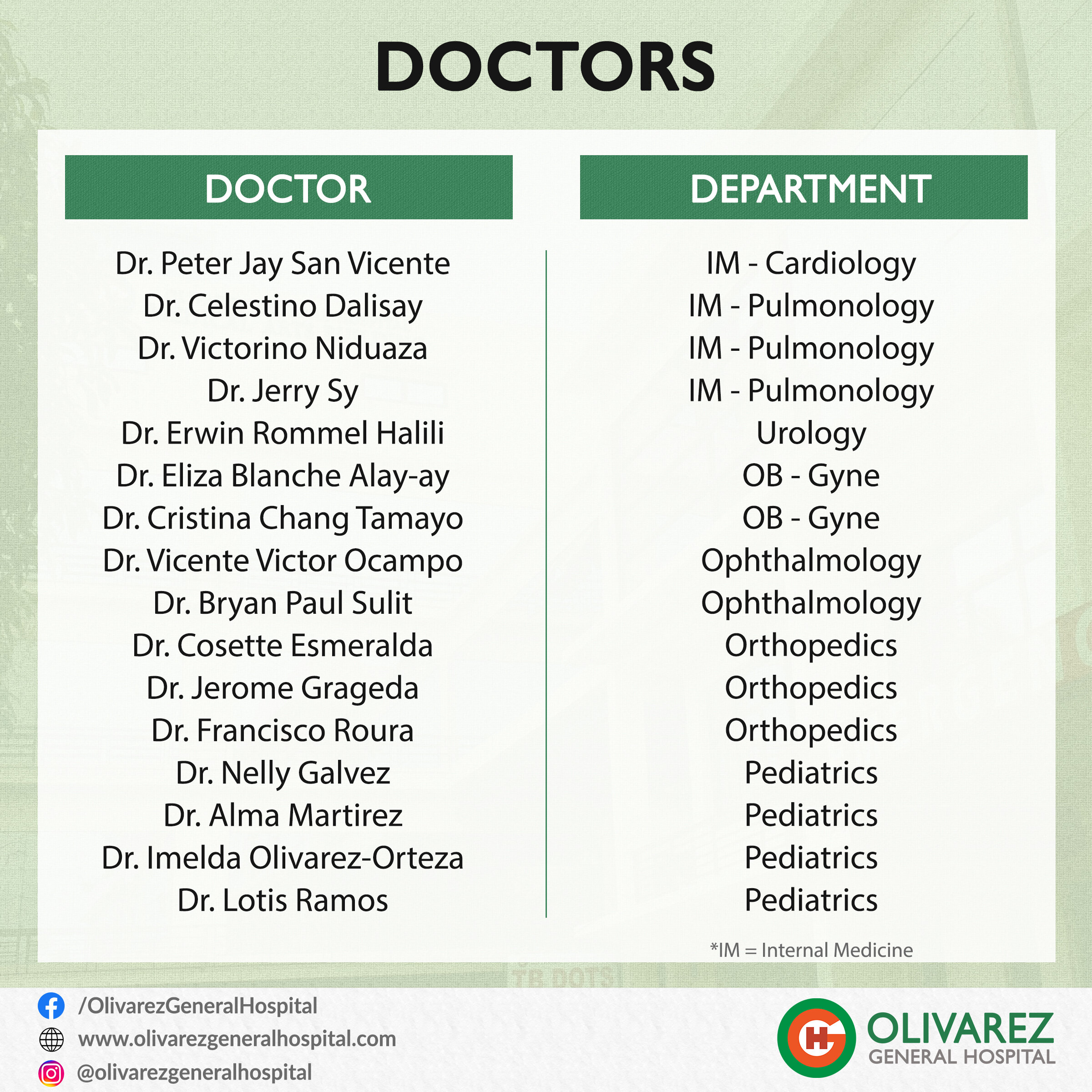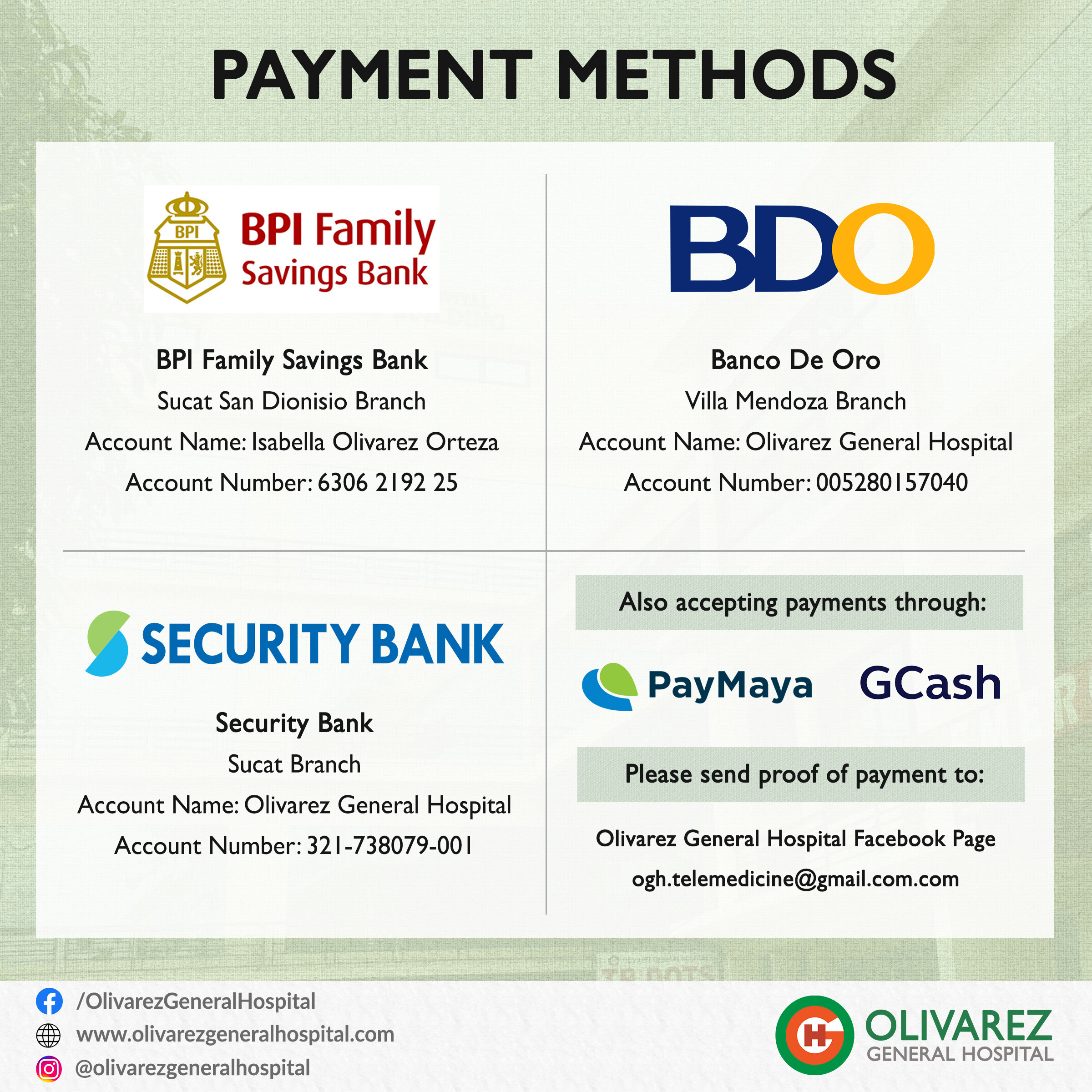If you wish to set a Teleconsultation appointment with our doctors:
First, read our Teleconsultation Policy below.
Next, click the button at the end of this page to sign the Teleconsultation Consent Form and send us personal information regarding your consultation.
Finally, you will receive a confirmation text from our personnel, who will also help you schedule an appointment with our doctors today. if you have not received a text, send us a private message on facebook. (https://www.facebook.com/OlivarezGeneralHospital)
Teleconsultation Policy
Introduction:
President Rodrigo Roa Duterte issued Proclamation No. 922, s. 2020 declaring a State of Public Health Emergency throughout the Philippines. Due to the alarming situation of the increasing health concern of corona virus disease (COVID-19) in the country, the seriousness of the threat prompted the President to issue Republic Act No. 11469, otherwise known as the “Bayanihan to Heal As One Act”.
In reference to the government’s declaration of placing the entire Philippines under Public Health Emergency, the use of telemedicine as the alternative course in providing medical services was introduced to the people through Joint Circular No. 2020-001 issued by the Department of Health and the National Privacy Commission.
Telemedicine involves the use of electronic communications to enable health care providers at different locations to share individual patient medical information for the purpose of improving patient care. Providers may include primary care practitioners, specialists, and/or subspecialists. The information may be used for diagnosis, therapy, follow-up and/or education, and may include any of the following:
Patient medical records
Medical images
Live two-way audio and video
Output data from medical devices and sound and video files
Electronic systems used will incorporate network and software security protocols to protect the confidentiality of patient identification and imaging data and will include measures to safeguard the data and to ensure its integrity against intentional or unintentional corruption.
Objectives:
Improved access to medical care by enabling a patient to remain in his/her chosen site while the physician obtains test results and consults from healthcare practitioners at distant/other sites.
More efficient medical evaluation and management.
Obtaining expertise of a distant specialist.
Support the implementation of the community quarantine issued by the government by providing access to primary health care providers through the use of telemedicine or providing medical consultation services through the use of the online and/or mobile platforms.
Reduce the risks posed by the necessary patient traffic in the hospital.
Possible Risks:
As with any medical procedure, there are potential risks associated with the use of telemedicine. These risks include, but may not be limited to:
In rare cases, information transmitted may not be sufficient (e.g. poor resolution of images) to allow for appropriate medical decision making by the physician and consultant(s);
Delays in medical evaluation and treatment could occur due to deficiencies or failures of the equipment;
In very rare instances, security protocols could fail, causing a breach of privacy of personal medical information;
In rare cases, a lack of access to complete medical records may result in adverse drug interactions or allergic reactions or other judgment errors;
What Personal Data do we collect:
The attending physician, nurses, and other members of healthcare team who are responsible for rendering service to the patient, may collect personal and sensitive information to ensure that you will be given the highest possible quality of patient care that you deserve. These information may include the following:
Basic personal information, such as but not limited to the patient’s name, date of birth, sex, and contact information
Relevant contact information of the patient’s relatives, guardian, or next of kin
Chief Complaint(s)
Medical history (such as, but not limited to, date of previous admission, existing illness, medication intake)
Vital signs (Blood pressure, temperature, pulse rate, respiratory rate)
Result of x-rays, scans, laboratory tests and other diagnostic procedures
Other information as necessary
How and When to collect the data?
The hospital shall collect accurate, and timely information about the patient in electronic and paper-based forms, before implementing the healthcare services that the patient would avail. In all instances, the patient has the right to amend, delete or suspend the information he/she has provided to the hospital. However, information that are vital in delivering proper medical health care to the patient shall be collected and the same shall be explained to them by the doctor assigned on their case.
Reasons for the Collection of Data:
For Medical treatment
When providing patient care and medical treatment, we collect the patient’s personal data to help us understand their current health status and to assist us in maintaining a record of the care and other services that the patient have received from the hospital. We maintain the patient’s medical record for efficient coordination between members of the healthcare team who are involved in the management their care. This will also allow continuity of care in case they return to us for follow-up or other healthcare services. For this purpose, Republic Act 10173, otherwise known as the Data Privacy Act of 2012, allows us to maintain these records.
For Reporting Requirements
Information about certain diseases and other conditions may be reported to the Department of Health or other agencies, as mandated and authorized by laws and regulations. Your health information may also be disclosed to the Philippine Health Insurance Corporation (PhilHealth) as required by law.
For Admission and billing, and claims processing
For the purpose of processing your hospital bill, your information may be used and disclosed to Philippine Health Insurance Corporation (PhilHealth), social welfare agency, your insurance company, Health Maintenance Organization (HMO) and employer to facilitate reimbursement of the hospital bill.
We will be obtaining an informed consent from you or your authorized representative prior to the use of your personal data for purposes other than those stated above.
Data Sharing
There are instances when we share your personal data to government agencies which lawfully collects information. For instance, the Department of Health requires submission of relevant personal information of patients with certain non-communicable and/or communicable disease, injuries, etc., for purposes of disease surveillance and monitoring.
We may also share personal information to fulfill legal mandate(s) like when ordered lawfully to do so by a court or a government agency or public authority.
We may also share personal information with our service providers, partners, affiliates, and related entities who provide products and services to the Hospital for the same purpose as explained above.
Securing patient’s personal data
Only authorized personnel have access to your personal information in our files.
We have set up adequate technical, physical, and organizational security measures to protect your data from unauthorized access and disclosure.
We store your personal data in accordance with period guidelines and limitations provided by the Department of Health for retention of medical records.
What are your Rights as the data subject?
You have the right to request a copy of personal and health information that we hold about you, as well as to ask for it to be corrected if you think there is anything wrong.
You have the right to object to, or withdraw consent that may have been given for, certain processing like direct marketing, trainings, or researches.
You have the right to suspend, withdraw, or order blocking, removal or destruction of your personal data from our filing system if you have substantial proof that your rights are violated, or that your data are incomplete, false, or unlawfully obtained; or processed for unauthorized or unlawful purpose.
